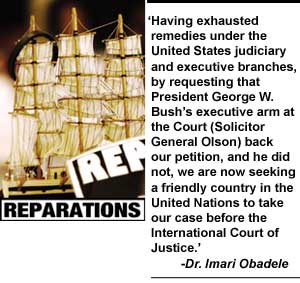FCNNEWSSOURCE

(FinalCall.com) – On October 6, the United States Supreme Court denied the petition for a writ of certiorari submitted on behalf of three Black men seeking reparations.
Dr. Imari Obadele, one of the applicants, almost immediately announced that legal action for reparations justice is not over.
“Having exhausted remedies under the United States judiciary and executive branches, by requesting that President George W. Bush’s executive arm at the Court (Solicitor General Olson) back our petition, and he did not, we are now seeking a friendly country in the United Nations to take our case before the International Court of Justice,” he stated.
Along with Dr. Obadele, General Kuratibisha and Kalonji Tor Olusegun originally brought this case to U.S. courts under the Civil Liberties Act of 1988, amended in 1992. Under this act, Japanese-Americans and their spouses of any race were paid $20,000 each for deprivation of liberty, for having been interned solely on the basis of race during World War II.
The U.S. Justice Department refused to grant reparations to the men (who sought five times $20,000), for the deprivations of the liberties of themselves, their fellows, and their ancestors, solely because they were not Japanese. The three men then filed suit in the U.S. Court of Federal Claims, which accepted their arguments for “standing”–the right for them to sue.
The chief judge of this federal court wrote: “Make no mistake, the plaintiffs have made a powerful case for redress as representatives of a racial group other than Americans of Japanese ancestry. The treatment of African Americans who were enslaved, oppressed and disenfranchised is a long and deplorable chapter in this nation’s history.”
However, he then went on to dismiss the case, stating that the Justice Department’s refusal of payment to the plaintiffs was “not arbitrary or capricious, an abuse of discretion, or otherwise not in accordance with law.”
This judgment was promptly appealed to the U.S. Court of Appeals for the Federal Circuit. Briefs were filed and oral arguments were presented on April 9, 2003. The three-judge panel affirmed the lower court’s opinion two days later, without writing an opinion of its own.
The case was then appealed to the U.S. Supreme Court by the usual Petition for a Writ of Certiorari. In his letter informing his clients of the Supreme Court’s decision not to hear their case, Attorney Milton Henry wrote: “The order does not surprise me, since the high court would be hard pressed to deal with the weighty issues involved, and considering this Government’s determination to disregard the enormity of the crimes committed against the African people and their descendants.”
He continued: “We understand better than most folk that we were born to engage in mortal combat with the forces that persist in denigrating us as a people and who then, under a cloak of righteousness and law, refuse to engage in any type of legal dialogue. Their denial of certiorari is 100 percent consistent with their 300-year history of obfuscation, exploitation and righteous denial of any wrongdoing. I am not discouraged by their shenanigans.”
Concluding his letter, he wrote: “As our Chicano brothers say, ‘the struggle continues.’ And, in spite of everything, we are obligated to remain involved on behalf of a better life for the peoples of the world, until we leave this scene. So–keep the faith.”












